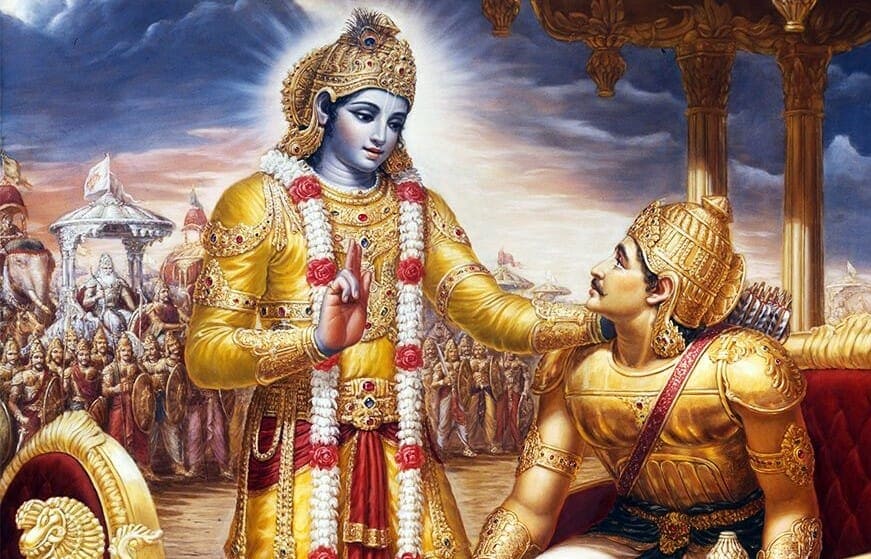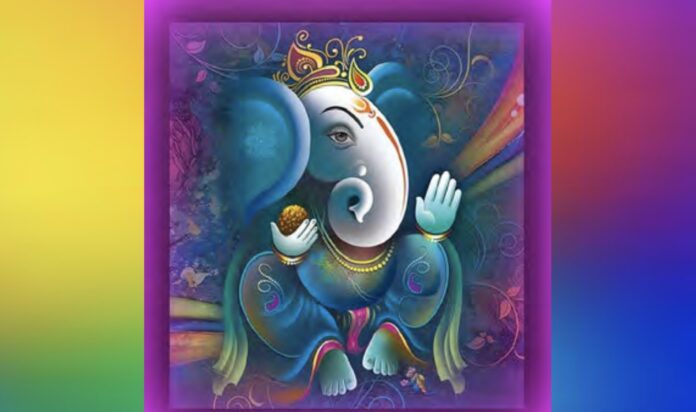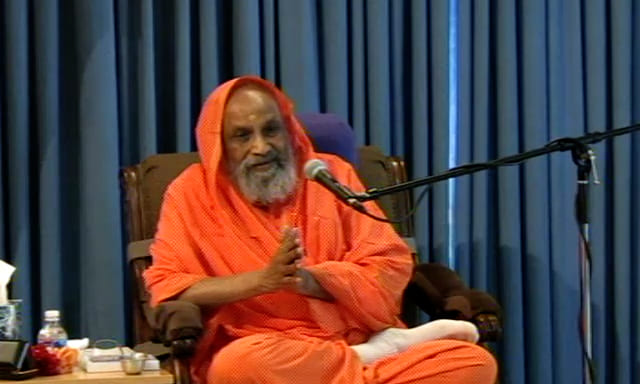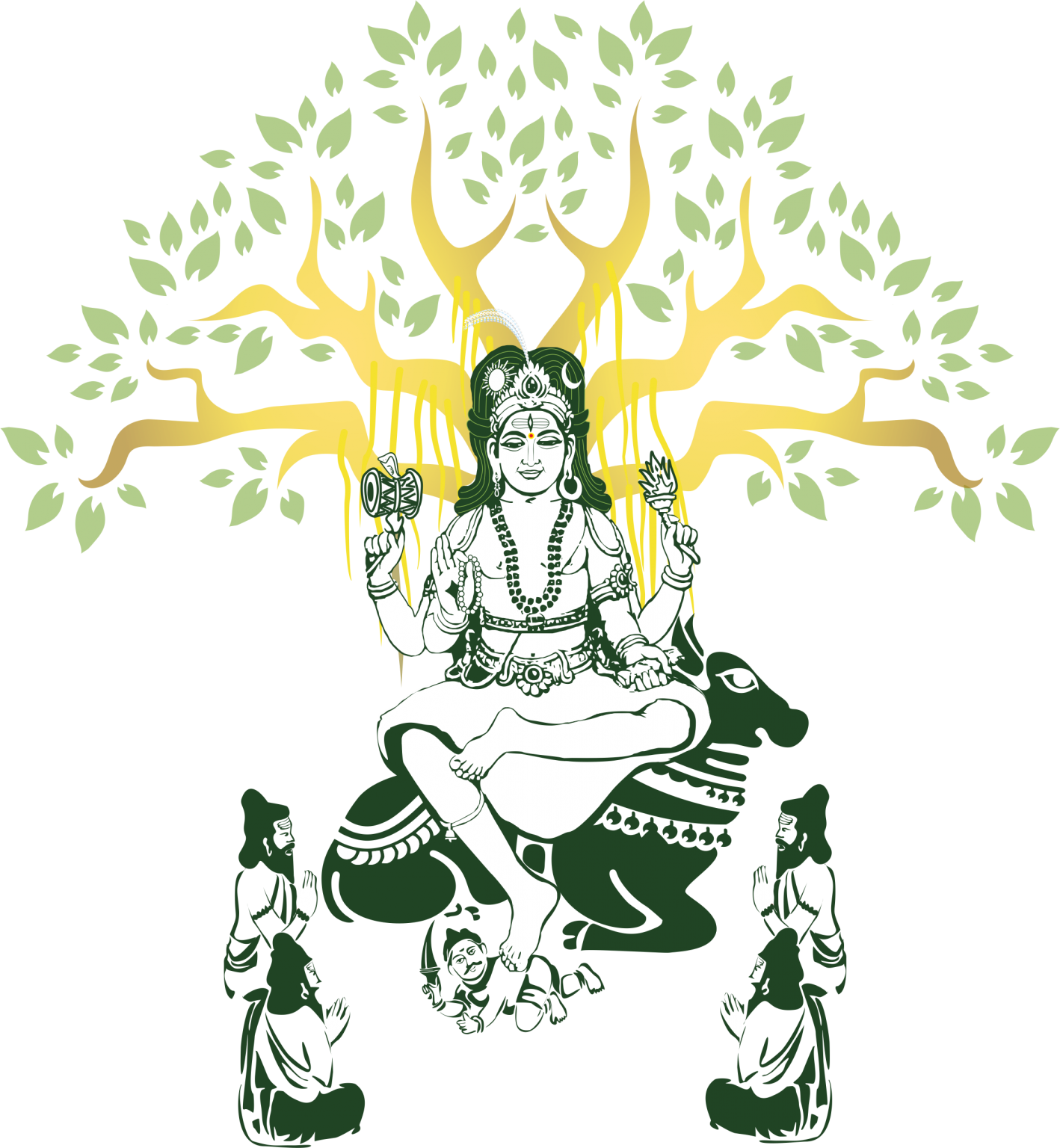(Praise of Goddess Sarasvatī)
Swami Dayananda Saraswati
[Published in the Arsha Vidya Gurukulam 37th Anniversary Souvenir, 2023]
yā kundendutuṣārahāradhavalā yā śubhravastrāvṛtā
yā vīṇāvaradaṇḍamaṇḍitakarā yā śvetapadmāsanā
yā brahmācyutaśaṅkaraprabhṛtibhirdevaiḥ sadā vanditā
sā māṁ pātu sarasvatī bhagavatī niḥśeṣajāḍyāpahā – (Sarasvatī-stotram, vs.1)
She who wears a garland of white lilies and is adorned with white clothing; whose hands are adorned by a vīṇā and making the gesture of protection (varadaṇḍa); the one who is seated on a white lotus; she who is always wor- shipped by Brahmāji, Acyuta, Śaṅkara, and the other devatās, and who completely removes ignorance; may that Goddess Sarasvatī protect me (by giving me knowledge).
Yā sarasvatī sā māṁ pātu. May Sarasvatī, the Goddess of knowledge who is going to be described, protect me. Pātu means rakṣatu, to protect. Who is she? Yā kunda-indu-tuṣāra-hāra-dhavalā, the one who is adorned with a garland of lilies as white as snow. Yā śubhra-vastra-āvṛtā, the one who wears śubhra-vastra, clothes that are also white in color. Yā brahmā-acyuta-śaṅkara-prabhṛtibhir-devaiḥ sadā vanditā. She is the one who is vanditā, meaning pūjitā, always worshipped and sought after, even by the trinity of devas – Brahmāji, Acyuta (Lord Viṣṇu), and Śaṅkara (Lord Śiva). All three of the trinity worship her, meaning they revel in this knowledge. Prabhṛti, which means ‘et cetera,’ includes all the other devatās as well. Either they revel in that knowledge or they seek that knowledge. Lesser Gods seek that knowledge and these three revel in that knowledge.
Finally, she is niḥśeṣa-jāḍya-āpahā. Āpahā is the one who destroys or removes. What does she remove? Jāḍya. Jaḍa means inert, so jāḍya means tamas in the sense of ignorance or dullness. She is the one who removes this dullness that covers everything. She removes ignorance and confusion, and brings clarity. She removes all distortion with reference to the reality about oneself and the world. There is always a distorted vision or perception, and she removes this distorted vision. How much does she remove? Niḥśeṣa. Śeṣa means left over, so niḥśeṣa means without anything left over. Therefore, she totally removes jāḍya. May that Goddess Sarasvatī protect me.
The navarātri festival is held for nine nights in September-October. Sarasvatī-pūjā is on the ninth day, and vijaya- daśamī on the tenth day, so it is for ten days. It is a huge thing and very popular in India. The worship of Goddess Sarasvatī is something amazing. When the sarasvatī–pūjā is done, they put not only books, but in India you will find all the musical instruments will also be on the altar. Any instrument – vīṇā, flute, mṛdaṅgam – and all tools as well. Even if you go to a blacksmith’s shop, you will see. A blacksmith’s shop is a place which no one likes. But if you want to visit a blacksmith’s shop, you should go on vijaya-daśamī day, the day after sarasvatī-pūjā. It will be absolutely clean, and everywhere you will find sandal paste and garlands. The bellows and fire pit will be all cleaned up; there will be no ashes. They clean it and put flowers, sandal paste, and kumkum, so there is no work that day. They will use all the tools only on the following day. So sarasvatī–pūjā day is for books and musical instruments, and vijaya-daśamī is for all other tools, including kitchen tools and other tools; the carpenter and the goldsmith put their tools too. Also, you will see all the buses in India having a lot of kumkum, sandal paste, garlands, and all these fes- toons. The drivers do that in Bombay and all the places. First thing in the morning, they do this pūjā and afterwards they start. Even in the government enterprises, which are secular, the fellows do this pūjā.
Any sādhana, tool, is worshipped – even wrenches and typewriters! When I used to work in an office, all the typewriters would get kumkum, candana, and all that. After all, they do the job and there is jñāna, knowledge, involved. In every tool so much knowl- edge is involved; whether it is a simple wrench or any kind of tool like a hammer, there is a technology. All technology started with simple hammers and axes, and this involves so much knowledge. Therefore, the sarasvatī-pūjā day is a day of technology, a day of ap- plied knowledge. You can keep books there, create an altar, and worship. Such worship takes a certain heart, a certain way of looking at things. For example, you cannot worship your car because it does not give you good mileage, etc. But you can worship it if you have this understanding of Īśvara from which nothing is separate. Therefore all śaktis are worshipped.
In Tamil Nadu, during these nine days of navarātri they make what they call golu. I do not know whether there is an equivalent in Hindi. They build a huge set of nine steps. On these steps they keep all these idols made of clay, or even of china or other materials. There are a variety of figurines representing the whole world – different types of people and so on. As a boy in my village, I wondered, how does an Englishman look? You will see a figure there, an English man, a black man, all these idols they make out of clay and paint. It is excellent. It is just for those nine days. Next to my village was a place where they manufac- tured these idols, and I think even today it is there. It was a cottage industry; every house used to make idols and sell them.
Each of the nine steps in the golu has different kinds of beings. At the top, first there are devatās such as Brahma, Viṣṇu, and Śiva. Then afterwards there are other devatās, Gaṇeśa and so on. Then you will find, step by step, yakṣas, kinnaras, angels, and so on, which are described in the books and given those forms. Below that, you will find all types of human beings: people from different cultures, different coun- tries, and all kinds of dress also. Then down below that, you will find all animals, all trees, all fruits, etc. The whole jagat is there – jagat-rūpam śaktiḥ. The jagat is śakti, and that is what they call golu.
Golu can also include modern technology – they will set up a big toy train track or make fountains where water is coming down all the time. This is all done by men, but it is a festival for women. So what do the women do? They call on each other. In the villages, even today, they will call on each other. They will in- vite each other to come to their house for kumkum and make the house sacred. The unmarried girls and mar- ried women all come in their best dress, in silk sarees and with all their ornaments. They go there and then they sing in front of golus in praise of the Lord. They sing various songs invoking the Goddess or the Lord in any form. There will be a lot of singing; people who come are asked to sing. Those who can sing will sing, and even those who cannot sing will try.
This is only for the girls and women. We boys also used to just go behind them, which is allowed up to a certain age. If you are young, you can go behind them and wait for the singing to be over. Then they distribute some prasāda and we would be ready for that. We would receive the prasāda and then go to the next house. If the prasāda was no good in one house, we would go to the other house with better prasāda. And if it was really good in one house, we would tail another group of people and go there a second time!
This navarātri festival shows how the Goddess is māyā, jagat-rūpiṇī. She is śakti because she is the pariṇāma-kāraṇa, the transformational cause. When we say Brahman is jagat–kāraṇa, the cause of the world, it is not only the adhiṣṭhāna, locus. Like the rope is the cause for the snake, Brahman is the cause for the world. But the real kāraṇa, cause, which undergoes a change to create the world – ākāśa, space, vāyu, air, etc. – is only māyā, the śakti, power, that abides in Brahman. That īśvara-śakti, bhagavatī, is the one who undergoes all the change; she is the jagat, the world. That is why māyā-śakti is invoked.
All our vṛttis, thoughts, are also māyā. Māyā includes even the knowledge that you gather by vṛtti, the vṛtti that destroys the ignorance of the reality. It is a māyā–vṛtti and therefore also mithyā, has no existence independent of Brahman. But that vṛtti is capable of destroying ignorance, so it is worshipped in the form of Goddess there. Even if you are worshipping Īśvara, only īśvara–śakti is worshipped, not Brah- man. When you are invoking Īśvara as sarvajña, all-knowledge, you are not invoking satyaṁ jñānam anantaṁ brahma, Brahman that is limitless existence consciousness; you are invoking sarvajña in order to know satyaṁ jñānam anantaṁ brahma. Similarly, the all-knowing Lord is invoked in various aspects. On gaṇeśa-caturthī day, the Lord is invoked as Gaṇeśa, the one who removes obstacles, and on sarasvatī–pūjā day, the Lord is invoked again as all knowledge.
Thus, all we require is some symbol of knowledge. A book has knowledge, even if it contains mistakes. Those mistakes also imply jñāna, knowledge, because to understand a mistake as a mistake is jñāna. To see what is true, you must know a thing as it is and see the truth in it. If you take what is untrue as the truth, that is a mistake. But if what is untrue is understood as untrue, that is knowledge. This is why we say any book is jñāna. All mistakes are also jñāna; you have to know that they are mistakes. Therefore, we do not bother about who is the author and what is written here because the book itself is a symbol of knowledge. That is why we can make an altar of books and pray; it is a different attitude, which is based on the śāstra, the sacred texts.
What you call the Hindu religion is just prayer based upon the Vedic vision. Unless your concept of Īśvara is straight, these types of worship – like worshiping a tool – are not possible. People might think that a tool is just a dumb object, but there is nothing dumb about it because it is all jñāna. There is an order to all of it. For example, if a nut is too big then the wrench will not work. There is law, jñāna, order, involved; it is all Bhagavān.
In this way, the whole life is a process of sanctifica- tion. From childhood you learn to appreciate and look upon things as sacred. It is not an ordinary thing. This is how you are built up from childhood; you build up a certain vision. You may not know anything about Vedānta. Many people do not know Vedānta, but they know that everything is sacred – that much they do know. They will say sab bhagavān hai, everything is Bhagavān. They may not know how that is so, but the attitude is different.
There are so many festivals. I consider some of these things very relevant to our life, outlook, attitude, and values. You bring that out only in a particular situa- tion, so you create the situation. You yourself dem- onstrate your attitude, like when you send a birthday card or a gift; it is an expression of your attitude and care. If all these customs are removed, what kind of life would it be? In every culture there are some beau- tiful things and if you remove them, there is nothing; life becomes all robotic. Thus, these things demon- strate certain attitudes. They reconfirm and reestablish a certain camaraderie and friendship, a certain care. Such actions bring these out. It is a physical act.
Here, in a ritual way, you bring out that sanctity by looking at knowledge itself as something very sacred. Very often we are told na hi jñānena sadṛśaṁ pavitram iha vidyate (Bhagavad Gītā, 4.38). Iha, in this world, na vidyate, is not there, sadṛśam, equal to, jñānam. There is nothing equal to knowledge.
Knowledge is pavitra, a purifying or sanctifying agent. What is it that really purifies? Fire purifies, detergents purify, a variety of things purify, but only jñāna can purify your heart. It does this by removing saṁsāra. All other things purify only within saṁsāra, but jñāna purifies you from saṁsāra. Saṁsāra itself is a mala, impurity, and it is only within saṁsāra that you are trying to purify, which is just some patch- work. The whole body is stinking and you just clean it, put on eau de cologne, nicely powder it, and make yourself presentable. This putting on eau de cologne and so on is purifying within saṁsāra. But saṁsāra itself is dirt and you have to remove that. For that, you need jñāna.
In the Gītā, just before “na hi jñānena sadṛśaṁ pavitram iha vidyate,” Bhagavān says, “jñānāgniḥ sarvakarmāṇi bhasmasāt kurute tathā,” the fire of knowledge reduces all karma to ashes (Bhagavad Gītā, 4.37). Agni, fire, is a purifier; it can purify a number of things. Gold comes out of the ground mixed with other ore, etc. If you put it in fire, you can get the gold out. So fire is a purifier and a great sterilizer. The ṛṣis knew agni as a great pāvaka, purifier. The name agni itself is a purifier, and that jñāna-agni purifies the original mala, impurity, which is saṁsāra.
Śāra is also jñāna. So śāradā means jñānam dadāti, it gives knowledge. Generally, however, śāradā is con- sidered a name, another name for Sarasvatī. In fact, I belong to Śāradā-pīṭha. The title Sarasvatī belongs to Śāradā–pīṭha. Bhāratī is another name for Sarasvatī. All of these are titles, like āraṇya in the name Vidyāraṇya and bhāratī in Candraśekhara Bhāratī. Āraṇya means forest, giri means hill, sarasvatī means the Goddess of knowledge, but these are also titles. Bhāratī also means the Goddess of knowledge, but it too is a title. These all belong to the Śāradā–pīṭha. There is a pīṭha in Śṛṅgeri called Śāradā–pīṭha. Those who have these titles belong to that particular pīṭha.
vande’haṁ śāradām vande’haṁ śāradām
viiśāradāṁ jñānadāṁ varadām viśāradāṁ jñānadāṁ varadām
śuddha-sattva-svarūpiṇīm śuddha-sattva-svarūpiṇīm śuddha-sattva-svarūpiṇīm
svaccha-hṛdaya-nivāsinīm svaccha-hṛdaya-nivāsinīm
svaccha-hṛdaya-nivāsinīm svaprakāśa-rūpiṇīm
svaprakāśa-rūpiṇīm
parāpara-vidyā-bhūṣitām svaprakāśa-rūpiṇīm parāpara-vidyā-bhūṣitām
suravara-sujana-sevitām suravara-sujana-sevitām parāpara-vidyā-bhūṣitām
śubhadāṁ sulabhām śubhadāṁ sulabhām
suravara-sujana-sevitām
susvara-vādya-niratām – (Composed by Swami Dayananda)
susvara-vādya-niratām – (Composed by Swami Dayananda) śubhadāṁ sulabhām
susvara-vādya-niratām
– (Composed by Swami Dayananda)
Vande’haṁ śāradāṁ viśāradām, I salute Śāradā. If you bring in the prefix vi to make it viśāradā, it means ‘an expert,’ so that śāradā becomes an expert in everything. Viśāradā means jñānadā – jñānaṁ dadāti iti jñānadā, the one who gives knowledge. Similarly, varadā means varaṁ dadāti, the one who gives you protection. What you ask for, she gives you. She is vara-daṇḍa-maṇḍita- karā, the one who protects you, and śveta-padma- āsanā, the one who is seated on a white lotus.
You will find that these (mūrtis) have one hand held up with the palm outward. It means protection, and is called vara-daṇḍa-maṇḍita. Thus, she gives protection to the fellow who is saṁsāra-agninā taptaḥ, burned by the fire of saṁsāra, feeling the afflictions of life, and seeking protection. Where will he go? The only refuge is jñāna, which is śruti, revealed knowledge. Śruti is śāradā. Therefore jñāna is only Sarasvatī. Śārada is the only refuge; there is no other refuge.
Therefore, varadāṁ vande’haṁ śāradām, I salute the one who is śuddha-sattva-svarūpiṇī. Śuddha-sattva means there is no malinya, impurity. There is no prob- lem and so all there is, is all-knowledge. This is called sattva-svarūpiṇī and the Goddess, who is knowledge, is always available only when the mind is clear. Any piece of knowledge is the same. Even if you are reading a newspaper, sometimes you have to read the column twice to understand it because the mind was elsewhere. You read it again and again, as though it is a piece of literature like Shakespeare or something! There may be nothing difficult to understand there, but the mind was elsewhere.
Therefore, Sarasvatī is present only when the mind is clean. That is why when we say ‘all-white,’ it means śuddha-sattva. Sattva represents the color white. There is a white mālā, white saree, white lotus, white swan – all of these are pure white. White means jñāna, knowledge, or svaccha, clarity. She is svaccha- hṛdaya-nivāsinī, the one who abides in a mind that
is clean: clean for the time being or clean for good. It means one who is not in the hands of rāga-dveṣa, attachments and aversions. That kind of mind is called svaccha. Even if it is clean only for the time being, it is a beautiful thing that the mind can drop all its ideas and be clean for some time; that is why you can under- stand me. And if it can abide in that kind of condition because of its freedom from the hold of rāga-dveṣa, then we say it is a clean mind. One has to work for it.
She is also svaprakāśa–rūpiṇī, self-effulgent. Without ātmā, the self who is a conscious being, there is no Sarasvatī. Cidānanda-ātmā, the self that is limitless consciousness, is the basis and therefore she is svaprakāśa–rūpiṇī, in the form of svaprakāśa-ātmā, the self-revealing self, which is myself.
Parāparā-vidyā-bhūṣitā. In the Muṇḍaka Upaniṣad it is said, dve vidye veditavye parā ca aparā ca, there are two vidyās, (kinds of) knowledge, we have to learn (Muṇḍaka Upaniṣad, 1.4). One is parā-vidyā and the other is aparā-vidyā. That is all; there is no other vidyā. If there is any knowledge at all, what is knowledge? Parā-vidyā is knowledge of oneself, and aparā-vidyā is knowledge of everything else. Parā and aparā – these two forms are what they call ‘all knowledge.’ There is no third discipline of knowledge. Therefore, the Goddess of all knowledge is both parā- vidyā and aparā-vidyā.
When we want to worship her in a particular form, we visualize her in that form. This is another privilege. Suppose someone does not think that God should have a particular form: if I ask him to think of God, what will he think of? Nothing! He cannot think of anything, but for us it is not a problem. It is good to have a form. It is not that the form is God, but at least you can think of it. When I say, “Think of the Goddess of knowledge,” and you can immediately think of a form, that is a privilege. We give a form for the Lord, but we worship the Lord, not the form. Then you can create an altar and do pūjā and various things. That is a privilege you get when you are born in a particular culture. We have to create or receive that privilege.
If she is worshiped as Goddess, then she is adorned with ornaments – like necklace, bangles, earrings, etc. Here she is parāparā-vidyā-bhūṣitā – the one who is bhūṣitā, adorned, with these two forms of knowledge. It is also bhūṣaṇa, an adornment, only if you are not under the spell of this knowledge, and instead you wield it. If you come under the spell of knowledge, you become proud, but if you wield the knowledge, then knowledge is always light. It is something like a person who is trying to cover up her face with some makeup; it is a problem. You have to look at the face in the mirror all the time. But if a person who is self- confident puts on makeup, there is no problem. She does not have any problem because she has nothing to cover. Because she accepts herself, any ornamentation becomes bhūṣaṇa. If you accept yourself, you can spend a lot of time in cosmetics because it does not matter; it is all Bhagavān’s glory anyway. But if you do not accept yourself, any makeup is a burden and a matter for anxiety because it will come off under the sweat. That is why she is bhūṣitā. Any knowledge just stays light because it is all knowledge, and she wields that knowledge.
Suravara-sujana-sevitām. She is sevitā, worshipped, even by the suravaras, the foremost among the devatās. Even Indra and others seek that knowledge, as we see in Kena Upaniṣad. The suravaras seek that knowledge, without which they will be simple devatās, comparing themselves with other devatās. She is also worshipped by the sujanas, thinking people who may not deliberately seek knowledge as such. Everyone wants to know, but they do not have the en- thusiasm and so they barter knowledge for the sake of wealth. That is why Lakṣmī becomes more important.
There are people who sacrifice to Lakṣmī and those people are all thinking people, sujanas. But Sarasvatī is sulabham, the easiest to get. Why? Because jñāna is already there, whereas lakṣmī is karma-phala – you have to produce that and it requires effort. Money is karma-phala. Even if you win a million dollars in a lottery, it is karma-phala. You may think that “I did not do anything,” but you have done enough before, and that is why you got it rather than anybody else. You have earned it. Perhaps you have earned it, but you did not get everything, because in between you made a lot of mistakes, and therefore you settled for only one million. Otherwise, if you had been prayer- ful, you might have made ten million; you don’t know. Karma-phala means you get what you work for. Lakṣmī is always karma-phala, you have to work for it, in this birth or in another one.
Jñāna is different from karma because when the pramāṇa, means of knowledge is available and the mind is available, it takes place. The knowledge that one plus one equals two does not require any money. It is not karma; it is a fact, but you will not know it until you are ready for it. Therefore, karma is neces- sary to make yourself ready, but jñāna is always sulabha, easy to acquire.
Śubhadām, she is the one who gives śubha, that which puts a grand finale to your whole undertaking. There is no beginning for the jīva, but there is a finale, which is called śubha. Śubha means anything that ends well – “all’s well that ends well.” Anything that ends well is called śubha, and śubha is mokṣa. Until then, the journey is on, the fight is on, the struggle is on until that freedom, that jñāna is gained. Therefore, śubhaṁ dadāti iti śubhadā, that which gives śubha is called śubhadā.
She is invoked in any place where there is attun- ement. In your mind, when the senses are all attuned properly, you find the pramāṇa. When the mind and everything are all attuned properly, the meaning of the śāstra clicks. You have to look at what it says, what came before, what came later, and then it just clicks. When you see that there is no other meaning for it, that also clicks. All the time it clicks; that is jñāna – it keeps clicking all the time. When things are attuned well, it always clicks, like a note played on a musical instrument. When it is tuned well, you get the notes in harmony. Otherwise, there is discord.




